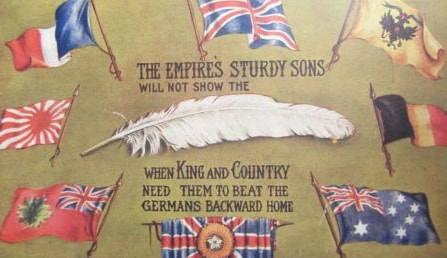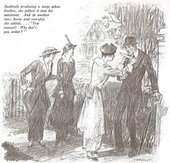|
My blog posts revolve around my interests and vocation as a historian: the intersection of history and contemporary church life, the intersection of history and contemporary politics, serendipitous discoveries in archives or on research trips, publications and research projects, upcoming conferences, and speaking engagements.
I sometimes blog for two other organizations, the Canadian Baptist Historical Society and the Centre for Post-Christendom Studies. The views expressed in these blogs represent the views of the authors, and not necessarily those of any organizations with which they are associated. |
|
Much of my research deals with religion and war in the early twentieth century, and recently I have been struck with an interesting similarity between the response to those who refused to fight in the First World War (1914-1918) and those who refuse to be vaccinated in the current war against Covid 19. More specifically, I am interested in the public shaming of those not in compliance with the war effort. As the casualty rate rose in the First World War, people were increasingly angered by those who did not enlist in the titanic struggle. Contempt was expressed for those who refused to fight. One common – and very public – way to shame people was for mothers and wives of servicemen to pass out white feathers to any men not in uniform who had the audacity to walk the streets and show their face in public. Of course, today we do not have actual white feathers being passed out to shame people into getting vaccinated, but the discourse surrounding the vaccination issue is marked by overt shaming. And it is carried out by politicians and people of all stripes in a wide variety of ways. But what is the problem with the white feather approach? Why shouldn’t people be shamed into supporting the war effort? While I am convinced that the current vaccines are an important part of the response to Covid 19, here are some thoughts as to why I am opposed to the white feather approach. 1. It Is Unnuanced
It is simply too simple to say that everyone who opposes a war effort is motivated by the same convictions. For instance, there were many reasons why people did not enlist in the First World War – some people were selfish, some were misinformed, some were cowards, some had responsibilities that required them to stay home, some were opportunistic and wanted to take advantage of options on the homefront. Yet there were also those who refused to fight on moral grounds due to their pacifist convictions or the belief that the war was unjust. Some also had health issues that were not visible to the shaming public. As for the war against Covid 19, there are people who refuse to get vaccinated for the most bizarre and wide-ranging conspiracy theories the internet has to offer. Yet there are others who have genuine and thoughtful concerns and hesitancy related to health and policy issues. Some also have health issues that are not visible to the shaming public. 2. It Is Self-Righteous Virtue Signaling Public shaming is a form of virtue signaling. There is an inherent self-righteous arrogance and pride that goes with virtue signaling, and rarely does anything good come from such origins. 3. It Is Coercive Shaming is a force of coercion, albeit a “soft” version. However, even a soft form of coercion does not always feel that way to the one targeted by it. The state certainly has a role to coerce people to not do something such as theft, murder, etc. However, I am much more reticent to support state or public coercion to do something, especially against one’s conscience. Yes, we all are forced to do things we may not like (pay taxes, wear a seat belt or helmet, obey the speed limit), but to be forced to go against a matter of conscience is a dangerous and harmful action that should rarely – if ever – be supported. We should feel free to argue and debate, but at the end of the day we need to be a protector of conscience and minority positions. Anything less finds us on the side of those in the past whose fear-fueled injustices makes us today blush with embarrassment or seethe with anger. 4. It Sets a Bad Precedent Those who enjoy the opportunity to shame others into submission need to be aware that the precedent being established may normalize coercion of dissent – a very dangerous trajectory indeed – and come back to haunt them in the future when their views do not reflect the public policy du jure. 5. It is Unloving, Disrespectful, and Dehumanizing I am all for thoughtful arguing with people over views of war or vaccinations – but public shaming is an inherently unloving and disrespectful act. To shame someone in public for their convictions is also ultimately a dehumanizing act. History is filled with a plethora of examples of the powerful mob dehumanizing the weak – let us not in our ardent desire to win the war add more examples to that sorry list. 6. It Changes Behavior but Not Minds Passing out feathers may shame people into action, but rarely does it change minds. As one sage commentator said, coercion usually makes hypocrites (they do something but don’t believe it) or martyrs (they refuse to change) – but rarely makes genuine converts. 7. It Has Negative Social Consequences Finally, public shaming is a sure way to break trust, destroy relationships, undermine community, foster discontent, and increase the role of coercion in public affairs. It may “work” (in that some people will be forced to do something they are opposed to), but the social costs are real and will last for generations long after the crisis has past. In conclusion, the use of vaccinations is an important component of the government’s response to the pandemic. Yet I am convinced that we need to avoid passing out white feathers in the current crisis. The society we are trying to save requires a kind and gracious treatment of one another, even for those whose views do not fit into the mainstream. Passing out white feathers in a war only damages what we are trying to save. So what is the way forward? Perhaps the final word should be given to a sage church commentator during the conscription crisis of 1917 - when tensions were high between supporters and opponents of conscription: "Our hope lies in the moderate and reasonable men of all parties and all faiths, who will seek to understand the point of view of those who differ with them, and who in relation to those of another race and faith will observe the rules of fair play and justice. Especially we must look to those who are actuated by the spirit of Christ, in which even justice is transcended, though never displaced, by the spirit of good-will and brotherhood. The Gospel of Christ will be found the solvent for this and all other national problems, even as it is the hope of salvation for the individual."[1] [1] “Our National Problem,” Maritime Baptist, 21 March 1917, 4. In a similar vein, bishop John Montreal stated: “I want to appeal to you all, not to say or do anything that will embitter the racial or religious feelings of any during the fight. Facts must be stated, but they can be stated in a gentle and manly spirit, not in clamouring denunciation.…fight as the servants of the Lord Jesus.” See John Montreal, “The Bishop’s Message,” Montreal Churchman, September 1917, 1. For details on the churches and the conscription crisis, see Gordon L. Heath, “The Protestant Denominational Press and the Conscription Crisis in Canada, 1917-1918,” Historical Studies 78 (2012): 27-46.
1 Comment
gary davies
4/7/2023 07:15:17 pm
nice to see these white feather/ shirker WW1 postcards but there is no provenance or link to where the images of these cards originated.
Reply
Leave a Reply. |
Archives
May 2024
|



 RSS Feed
RSS Feed
